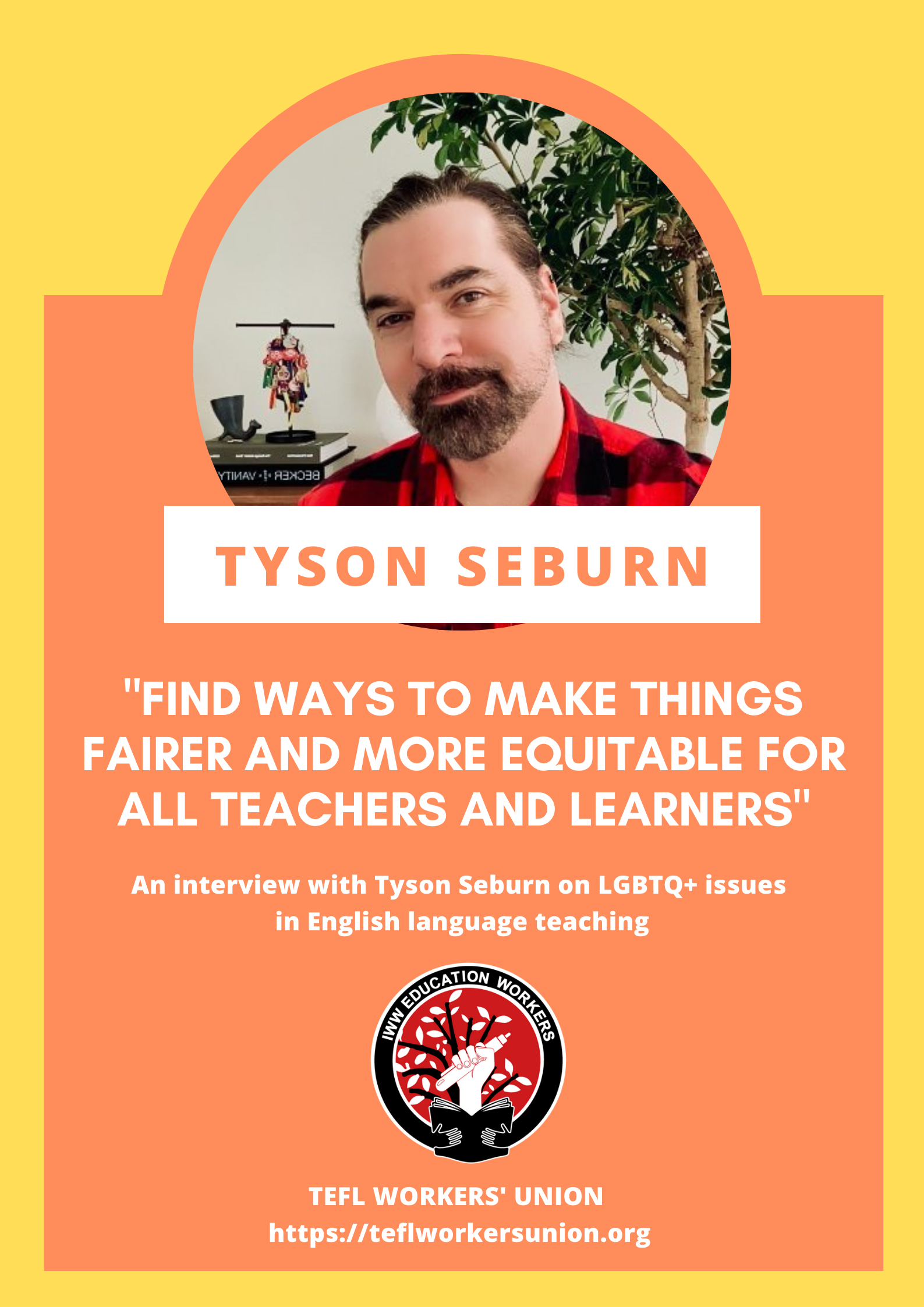The TEFL Workers Union is proud to have interviewed Tyson Seburn. Tyson is an English language teacher who has been a consistent voice for LGBTQ+ inclusion in the industry and has even produced a prototype on what a non-heteronormative text book could look like. Check out his work and follow Tyson on Twitter @seburnt
Tell us about your work in ELT. What sort of research do you? What do hope are the practical results of your research?
I’m not sure ‘research’ is the best word to describe my focus areas in ELT; it’s lived experience as a gay man and of being an ELT teacher, manager, and materials writer working with LGBTQ+ folx* and of course, everyone else. In particular, I take the invisibility and underrepresentation of minority groups, like the LGBTQ+ community, and try to help my global ELT colleagues acknowledge this issue, and then find ways to make things fairer and more equitable for all teachers and learners.
In terms of LGBTQ+ issues, what do you think are the most pressing matters for the industry?
I’d say it’s the general acceptance that certain types of people are acceptable and others are not, depending on the situation. This extends from the classroom to hiring committees to positions of power and visibility in teaching associations, cultural organisations, and publishing companies. We collectively need to work to undo this conditioned perspective.
What can the industry (schools, publishers, conferences) do better when it comes to LGBTQ+ folks?
There’s so much! But I resist listing tick boxes for each of these groups. That’s far too simple and meaningless. Lasting change requires effort. For all and for a start, examine your institutions. When looking at the people at the top and bottom, your policies, and the perspectives that inform future decisions, what do these say about whose perspectives you value? Consider why that is. Then pay LGBTQ+ (and/or other underrepresented folx) to help.
Many industry bodies, the British Council for example, talk a big game on social issues. In your opinion, is ‘pink-washing’ an issue in the industry? To what extent is this concern genuine and to what extent is it reinforcing a liberal veneer for an industry that has long been intertwined with colonial and corporate exploitation?
That’s a meaty question! Yeah, sure there’s pink-washing going on in ELT, as there is everywhere. It takes consistent, repeated, on point words and action to know that anything is more than just a shiny wash on a broken foundation. To give some credit, the relationship and behaviour of organisations’ words and action can be deceptively complex. When the degree to which I want change may not be what an organisation feels capable of, I too sometimes get frustrated at the glacial pace of change. I try, however, to acknowledge that in context X, the organisation may feel they’re doing good work in a sort-of backend way within context X’s limitations and if they went bolder, they might lose the ground they’ve made. Maybe they’re right. Maybe they’re just worried about their bottom line. I’m not 100% sure because a bold move hasn’t been tried and tested long term.
What steps can ELT staff and ELT staff organisations take to support our LGBTQ+ colleagues?
Recognise and acknowledge the power that you hold. That might be through the words and vocabulary you use with learners. It might be the ability to supplement the invisibility we face in your materials. It might be in curricular decisions. It might be in supportive policy creation and enforcement. Use what power you have to influence those who have different power to use theirs too. Public action makes a big difference.
Tell us something positive that you’ve seen in terms of ELT and LGBTQ+ issues?
The proliferation of talks, articles, and discussion about inclusive practices these days is encouraging. There was a lot less even 5 years ago. It seems like a lot more people are interested in learning and improving their practices and materials. We’re now just at the precipice of real action though, so we’ll see what comes in the next 5 years before I commit to patting us all on the back.
Anything else you’d like folks to know? One piece of advice for how to improve ELT?
Please don’t ask us to prove our experiences to you before you believe us. We are real people who know how social norms have affected us. We know our experiences best. When we advise about action that will create a more belonging educational environment, please just listen.
*I use ‘folx’ because it is free from being gendered, sexualised, racialised, or ableist. As opposed to ‘folks’, the X to me forces the reader to notice it, like the underrepresented identities who must be valued alongside everyone.
